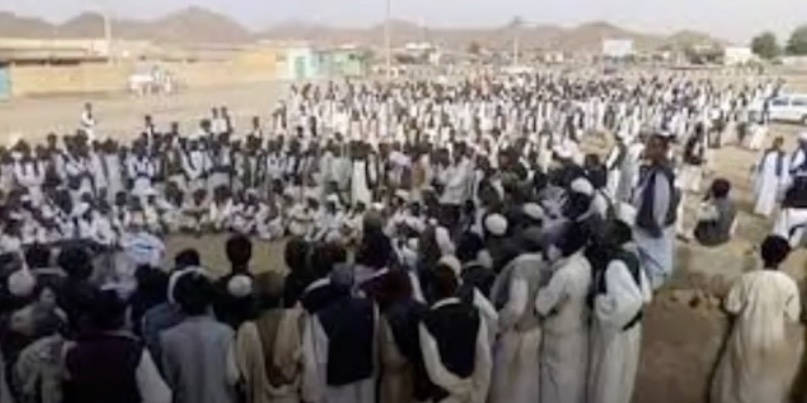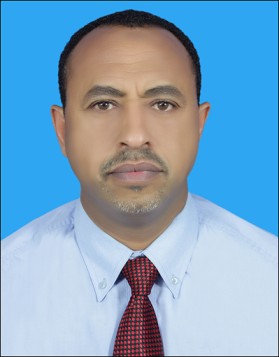Condemning in Arka Saber’s Poetry

Condemning is one of the important topics that the poet, Arka Saber, repeated in his poetry due to those who tried to disrupt the successful course of the Beja revolution and to the weak responses of some Beja people whom he constantly called on to join the Beja revolution.
Since his discursive style equipped him to classify these inhibits as reasons affecting the youth’s reluctance in following them, Arka alerted the irritation and delay of joining them in the struggle of the revolution. Therefore, he wanted opinions to either agree with his claims or to reduce its negative impact so that they can enhance their revolution.
Using three of Arka’s poets or songs as examples, this article details these claims, which could have been reasons for unsuccessful revolution if they were not highlighted by the poet. For example, in the poem, “Isanoon“, which means our brother, Arka reviewed the real factors of delay to join the revolution. The poem is sung by singer Mohammed Al Bedri.
“Isanoon“
| Bejawiet lines | Arabic translation | English Translation | Transcription |
| سوننيك اوفروس دهييب اكييك,دنننيك ناتون أكي تهسرييك,وأقيا نات بامترريم نكييك, اونتا نان داورستنهون اشقاي | حدثناهم عن الفروسيه صاروا لغيرنا,ولو صمتنا خسرناهمومن الصعب علينا السكوت عنهاافيدوني ماذا نفعل بالثورة | We informed them about chivalry, but they become for others. If we didn’t speak, we lost them, remaining silent is difficult, what to do with the revolution. | /sɔ-nǝ-neik ɔf-ru:s deh-jeib ikǝ-jeik/,/din-nǝ-neik nᴂ-tɔ:n ǝk-kai tehǝ-sǝ-reik/,/wǝq-jǝ nᴂt bᴂm-ter-rǝ-ri:m nikǝ-jeik/,/ɔn-tǝ nᴂn daʊ-rǝ-ri:s-tin-hɔi/ |
| يا سنون نينيك اشوب اكييك ,اونتا كك واسيتيت يهنيب نكتيني | قلنا اخواننا وصارو اعداءنا,كيف نميز ونعرف اصدقاءنا. | We said they are brothers, but they become enemies. How can we distinguish our friends? | /jǝ sǝ-nɔ:n-nei-neik ǝʃɔ:b i-rǝ-meik/,/ɔn-tǝ kʌk wᴂ-si:t jeh-neib nei-kǝ-ni/ |
| ماقتكون نينيك اباقي امقييك,أبارا اهرونيت وأساسو نقميك,اوبري كبسي مدات نسييك,اونتا نان هييس بجاي وأراريو. | قلنا من جهلهم ولكن يتبعهم الباقون,ولم نعرف ما يريدون الوصول له,وطال الزمن مع عدم مصارحتنا لهم,اقيدوني ماذا نفعل بالثورة | We expected that would be due to miscalculation, but the rest have followed them, and we didn’t recognise what they want to achieve, time passed as we didn’t be frank, what to do with the revolution. | /mᴂq-tʌkɔ:n nei-neik i-bᴂqi irǝ-meik/,/ibǝ-rǝ hirw-neit wǝ-sǝ-sɔ ni-qǝ-meik/,/u-bǝ-rei kub-sei mid-dᴂt nis-sin-jeik/,/ɔn-tǝ nᴂn hǝj-ji:s bi-ʤaijǝ-rǝ-reiw/. |
| قدي نئيت يكسيتيت واعدو نقيديك,قلي واشوب بيتيت قرش نينأليك,توي هرؤن اشتيت قريب شخصياي,اتاريخ هدوري كدعيمنا | لو جزء مننا ينهض للثورة,واخرين يتوسلو لغيرنا لمبالغ ماليه,ونترك وراءنا الغريب,تتوقع تاريخنا لا يضيع؟ | If some of them intend to revolutionise, and others beg for money, leaving strangers behind. Don’t you expect our history to evade? | /qǝdi neit jek-si:t wǝ-du nei-qǝ-deik/,/qǝli wǝ-ʃɔ:b bei-ti:t qi-ri-ʃ nei-nǝ-leik/,/tɔi hǝr-ɔn iʃ-ti:t qǝ-ri:b ʃǝk-si-jai/,/i-tᴂ-ri:k hǝd-dɔ:ri kǝ-dǝj-jem-jǝ/. |
With a little frustration and a strong desire for change, Arka began his poem in the first two lines by stressing on chivalry that the Beja adores and die for it; saying: the benefits of our revolution had gone for others because we did not discuss what they supposed to do so that we can advantage from their contributions. Since it is now becoming difficult for us to remain silent; what could be done with our revolution? We believed that they were brothers, but they constantly kept on playing the role of enemies and as a result, we were not able to distinguish between our friends and those who were not.
In the third and fourth lines, the story was presented clearly, as he attributed it to the unawareness of Beja Congress’ objectives, but its impacts were extended on the rest of the locals. The poet says that we could not recognise their goals, and it took us a long time without discussing the issue honestly. Therefore, could you share with us, what can we do with our revolution? It is shame and our history is being destroyed and distorted if some of us beg for money at a time other are still on their revolution.
The poem, “Im’ma’laayi“, which means costly, is referring to the glory that was achieved by striving revolutionaries efforts. He also listed the advantages of accepting blame as a possible roadmap for reaching some understanding points.
“Im’ma’laayi“
| Bejawiet lines | Arabic translation | English Translation | Transcription |
| أمأليي باريبنا ايشك ايفالتدروي باقامنا اوبجا نانا اخرميا بادينا | لا ترفضو الضروري العلو أوالفأل,ولا تقولو لماذا تأخر ثوار البجا. | Do not reject necessity, glory, or omen, and do not say why the Beja revolutionaries are late. | /i-mǝ-lia bᴂ-ri:b-nǝ ei-ʃǝk ti-dɔ:ri bᴂ-qᴂm-nǝ/,/ɔ:b-ʤǝ nᴂn ǝkeh-rʌm-jǝ bᴂ-di:-nǝ/. |
| امرهسي ديتيت+ أمأليي باريبنا ايشك ايفال تدروي باقامنا اوبجا نانا اخرميا بادينا | لا ترخص وترفض العلو الضروري,ولا تقولو اين ثوار البجا. | Do not authorise and refuse the necessary glory,and do not say where are the Beja revolutionaries? | /im-rehs di:-ti:t i-mǝ-lia bᴂ-ri:b-nǝ ei-ʃǝk ti-dɔ:ri bᴂ-qᴂm-nǝ/,/ɔ:b-ʤǝ nᴂn ǝkeh-rʌm-jǝ bᴂ-di:-nǝ/. |
| اوبجا يكينيك اوسلام سأيامانا,داوري فالي اتحرير اكيداتو,مسيتي يفاتييب تهلأ اكراتو | لو تحرك البجا توقعو السلام,التحرير مؤكد وبفأل جميل,مازلنا في مواقعنا وخلعتهم قوية | If the Beja moves, expected certain peace and liberty, with wonderful omen, we are scaring them since we are still in our camps. | /ɔ:b-ʤǝ jǝ-kei-neik u-sǝ-lᴂm sǝ-jᴂ-mᴂnǝ/,/du:r-ǝreit fᴂlei i-the-ri:r ǝ-ki:-dǝ-tu/,/mǝsi je-fᴂ-teib tuh-lǝ ǝk-rᴂ-tu/ |
| ناناياب تقبيلة سنقدنااونتا يعينيب اشريط سناكرنا,يأدم يعينيب تمعلومه كيلوانا. | لا تميزو بين بالقبائل,واسمعو كلامي اللاحق,( لانه)متسلل بمعلومات وحافظوا عليها | Listen to my message that integrates information and preserve it, “do not differentiate between tribes”. | /nᴂ-nǝ-jᴂb tu-qǝ-bi:lǝ siŋ-qǝd-nǝ/,/ɔn-tǝ jǝ-ni:-b iʃǝ-ri:t si-nᴂ-kir-nǝ/,/jǝ-dim jei-ni:b ti-mǝ-lu:-mǝ keil-wᴂ-nǝ/. |
| سقي ميداب تسياسا قيقسانا,ياديب ايماق اقريما هديدسانا,سدك أمنا. . يأرريو سيأمانا | ابعدو عن السياسه,ولا تتحدثو بالقبح من الكلام واتركوه لغيركم,اصدقو القول واتوقعو الشباب. | Get away from politics, avoid uglifying words and leave them for others, expect the Beja will come. | /sǝqi mi:-dǝb ti-si-jᴂ-sǝ qi:q-sᴂnǝ/,/jǝ-dim ei-mᴂq i-qǝ-ri:mi hǝ-di:d-sᴂ-nǝ/,/sid-dik ǝm-mǝ-nǝ jǝ-rǝ-rei-wǝ sǝ-jᴂ-mǝ/. |
| اصبر قيب اترموما قودسانا,يأدم ايشوب تراتي هديدانا.اوبجا دايما اقرموكنا سوونا | مع الصبر اكثرو من الاحترام,واتحدثو بالقول الحسن,والبجا دائما ارفعو راسكم. | Patience is needed with more respect, speaking politely raises the Beja revolutionary’s head. | /isǝb-ri qeib i-tǝr-mu:-mǝ qu:d-sǝ-nǝ/,/jǝ-dim eiʃ-bu:b ti-rᴂ-ti hǝ-di:-dǝnǝ/,/ɔ:b-ʤǝ di:-mehǝ i-qir-mɔ:k-nǝ saʊ-win-nǝ/. |
| اوكلاشن تأمانا دهاي بعانا,اوقريموك تتهروني راتانا,ته تهتينيك اشرعي دامانا | والكلاشن امانة في عنقكم,ولو احتجت اسال غيركم,ولو لمسْتم شيئا اتبع الشرع | Keeping Kalashnikov (Russian gun) is your responsibility, and for your enquiries, ask governor, for other needs, follow the law. | /u-ki-lᴂ-ʃin tǝ-mᴂ-nǝ dehai bᴂ-nǝ/,/u-qǝ-ri:-mɔ:k tu-the-riw-ni rᴂ-tᴂ-nǝ/,/the- tei-neik u-ʃǝ-ri: dᴂ-mᴂ-nǝ/ |
As Arka begins his poem, he listed all the effective stories that contributed to the success of the revolution by the revolutionaries who were evaluated by public people. He also alerted some do’s and don’ts that were supposed to be avoided as well as assessing the positive results as achievements and following them in order to enhance the completion of the revolution.
Arka’s strategy of giving hope to those who are around him was successful in injecting the revolutionaries to go forward in taking on difficult challenges. As there was a claim of some negative outcomes that many people who were against the revolution tried to highlight, Arka defended the revolutionaries and reacted with these hints in the first lines of his poem “Im’ma’laayi“. First, he confirmed that the Beja movement was expected to result in achieving peace that we would all benefit from it. He added that the omen scared others because they were worried that a fight could take place again at any time. Therefore, inappropriate words could send the wrong message for all.
Arka added a focal point that could be considered the turning line in the course of the revolution because he basically looked at preserving the community from rupturing. As many people were blamed for sticking to traditional issues, such as rising tribal discussions in political issues, which led to destroying relationships. Finally, he criticised his society for being impatient with waiting for the positive outcomes of the revolution. He also called to build trust as a virtue that must be ascertained by the revolutionaries in their everyday practices through preserving properties they have, following the prevailing laws, and not exceeding the limit of Sharia in any case.
In his poem “Obja banaiwa“, which means “don’t insult Beja”, Arka confronts the media, especially the Beja media on Kassala Radio and TV. The poet reported various scenes to prove his claims about the unsuccessful media messages, which aimed to terrify the youth with untrue stories.
“Obja banaiwa“
| Bejawiet lines | Arabic translation | English Translation | Transcription |
| اوبجاي بانيوي كسلا تأزاعاتيب,عدو مركاييب باقوفميت كلمهشهداب الياب اتاريخ هديديني | لا تشتم ثوار البجا في ازاعة كسلا,خوفا و مضطرب الكلام,نحن مهرنا ثورتنا بشهداء غالين. | Do not bitch up the Beja revolutionaries on Kassala radio, with fearful and disturbed words, our revolution is endowed with the martyrs. | /ɔb-ʤǝ bǝ-nei-wai kǝ-sǝ-lait ti-zᴂ-ᴂ-ti:b/,/ǝdu:b mir-kwᴂ-ji:b bǝ-qɔ:-fǝ-mait kǝl-mǝ/,/ʃu-hǝ-dǝb ǝl-jᴂb u-tᴂ-ri:k hǝ-di:-di:ni/ |
| قال يهبر نقيب اورا اراتينينان رهتا ديتيت ديسيت هديتسينيوعدو فعيب دايايا وهاف كرتبي دنقي | احدهما يسأل ولاخر يجيب,ويسألهما ماذا رايت بصوت خافت,لانهم وسط عدونا مرعوبين. | Whispered what they saw, when they were askedbecause they were among terrified enemies. | /qǝl jehber qwǝm-bi: u:-rᴂw ǝ-rᴂ-ti:-ni/,/nᴂn reh-tǝ di:-ti:t di:-seit hǝ-di:-di:-ni/,/wǝd-wi:b fi:b dǝ-jǝ wehᴂf kir-ti-bei ḑn-wi:/. |
| اي رداب كيكين هوي جسسساب اندا,قلي قيبون هين وري وهاشي وين داينا.. غالطينون كدبوي راتانا | ثوارنا لم يترددو ولم يتجسسو,جزء منهم موجود واخرين ماتو,ولو تريد تتاكدو اشألو “كدبوي”. | Our revolutionaries neither hesitate nor snoop,some are still there whereas others dead,to confirm, check with “Kadabot”. | /ejǝ rid-dǝb ki:-kein hɔi ʤǝs-sǝ-sǝ-mᴂb ki:-kein ǝn-dᴂn/,/qǝ-li qei-bɔn hein wǝ-ri wehǝ-ʃi wehi: dǝ-jǝn/,/qᴂ-lǝ-tei-nɔk/. |
| اوبجا يعيببتاهن كستا نفت كيكين,حاربا بادي اور اوبجاي كناضليا, اقنا قوهميناي يارب استرا وهالون | ثورتنا ليست دائما حلوه,ولو غادر منا جزء سيناضل الباقي,من تغيرت نوايا يارب استره. | Our revolution is not always sweet ,if some have left, the rest will remain.Who changes intentions, Oh Lord, cover it. | /ɔb-ʤǝ ti:-bǝb-tǝ-hǝn kǝs-tᴂ- nǝ-fit ki:-kein/,/ hᴂ-rǝ-bǝ bᴂd ɔ:r ɔb-ʤai kǝ-nᴂ-đel-jǝ/,/u:q-n?ǝ qwehᴂ-mi:-ni jᴂr-bǝ ǝs-ti-rǝ wehᴂ-lɔ:n/. |
| اي رداب باكاي واجبون قاماب باكاياندا قيقينهون اري دهاي مهيابيتوا نصراتو تون قات تكيتوتو | لم نتردد ولم نترك واجبنا,ولما غادر بعضهم تبقى الاخرون,اما الموت او النصر مصيرنا. | We did not hesitate or leave duty,because the remained have targeted to die or victory | /ejǝ rid-dǝb bᴂ-kai u-wᴂ-ʤ-bɔ:n qǝ-mᴂb- bᴂ-kai//ein-dǝ qi:-qi:n-hɔb i-ri dehai meh-jᴂb/,/jet-wǝ nǝs-rᴂt-wǝ tɔn qᴂt tǝ-kwei-taʊn-tu/ |
| اوبجا ياب كنكي رتبات جلاي دا,اجر تاك اندي يطفال هرعون هايي ,اوت ترتباتون راتني اون اكلاشون | ثورتنا ليست لمناصب,بالرغم من فراق اطفالنا لم نتغير,أسال وظيفتك الكلانشكوف. | Our revolution is not for positions,despite the dropping of some, we held on, ask the job your Kalashnikov.(Russian gun) | /ɔb-ʤǝ jᴂb-kin-ki rut-bᴂti ʤǝl-lai dehai/,/ǝʤri tek ǝn-di ǝt-fᴂl hǝr-ɔ:n hᴂ-jei/,/ɔt-ti-rit-bᴂ-tɔn rᴂt-ni ɔn-iki-lᴂ-ʃi-nɔ:n/. |
| لبسوي اوفاش وطاهر شغل جيشوا, بيت تمجموعه تدبي دهنات باكايت,اندا سور ابين كيان اشويقا؟ | أسال عن “لبسوي اوفاش” و “طاهر شغل”,من مجموعتهم التى لم يسلم منها احد,اين رجالنا وزملاءنا. | Ask for “Labasoi Ofash” and “Taher Shuqul, those who did not run away from the battle, where are you our men and co-revolutionaries? | /lʌ-bǝ-sɔi ɔ:fᴂʃ wǝ tᴂ-hir ʃu-qil ʤei-ʃ-wǝ/,/beit ti-mǝʤ-mu:-?ǝ ti-ḑǝ-bei ḑehǝ-nᴂt bᴂ-kait/,/ᴂn-dǝ su:r i-bein kei-jᴂn iʃaʊ-jǝn/ |
To confirm his claim, Arka detailed the right positions of the revolutionaries whom he describes as strong men on the battlefields, confirming that he added that they were neither spies nor hesitant because while some were martyred, the others remained on the battlefield. So, in his reply to the media, Arka wondered, “If you were not sure about what I reported, you could have asked for the battle “Kad’dboit”. Moreover, after blaming the local media, he repeated that they would remain here either as martyred or victorious revolutionaries.
The poet concluded by responding to accusations that their revolution was demanding and aspiring for political positions and not at all to fulfill a case of people, saying, “We are not requesting for authority because we will seize it”. He added that we, who left our children behind without asking anyone’s sponsorship, wouldn’t expect to budge from our positions because we were the followers of “LabasoyOfash” and “Taher Shuqul” who remained on the battlefield fighting until they were martyred in order to secure a safe exit path for their comrades.

Dr Hassan Adrob is a Sudanese based in Oman and works as an English language and Linguistic lecturer and a teacher trainer at Red Sea University and Sohar University. His MA and PhD are in Applied Linguistics. Dr Hassan is a qualified CELTA instructor and has participated in an accredited IELTS Training Programme. He fulfilled the twin duties of lecturer in English and skills leader. Dr Hassan is a regular participant at conferences and has recently published three books with Eliva Press.




